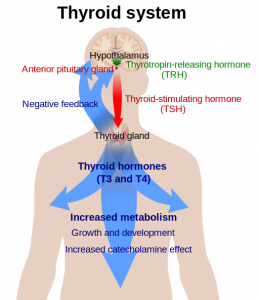In the CATALYST study, researchers found that selenium supplements and placebo supplements improved the quality of life of patients with hypothyroidism to an equal extent. Accordingly, the researchers have now emphasized a need for more research into the effect of selenium supplementation on immune system function, on oxidative stress, and on low-grade inflammation in patients with thyroid diseases [Larsen 2024].

The CATALYST study was a multi-center randomized, double-blinded, placebo-controlled clinical trial conducted in Denmark. The study participants were patients aged 18 or more years with serum thyroid peroxidase antibody (TPOAb) levels equal to or greater than 100 IU/mL. 82% of the study participants were women [Larsen 2024].
The researchers allocated the patients one-to-one to daily supplementation with 200 mcg selenium as selenium-enriched yeast or with matching placebo tablets for 12 months. The supplementation served as an adjunctive therapy to levothyroxine (LT4) treatment. They assessed the study participants’ quality of life using the Thyroid-related Patient-Reported-Outcome questionnaire at baseline, after 6 weeks and after 3, 6, 12, and 18 months [Larsen 2024].
Why the Equal Effect of Selenium and Placebo?
The CATALYST study outcome is a bit of a puzzle. Consistently low selenium intake is associated with an increased risk of thyroid disease, hypothyroidism in particular. And, some patients with Hashimoto’s thyroiditis, the most common form of hypothyroidism, do have a positive response to selenium supplementation [Schomburg 2020; Wang 2023]. One might have expected a more positive effect from the selenium supplement than from the placebo.
Professor Lutz Schomburg, Institute for Experimental Endocrinology, Charité Universitätsmedizin Berlin, offers the following possible explanation. The benefit of selenium supplementation for hypothyroidism patients may be the effect not on the thyroid gland itself. Instead, the positive effects of the selenium supplementation may affect the functioning of the immune system [Schomburg 2020].
Schomburg points out that the thyroid gland gets a prioritized supply of selenium. Consequently, supplemental intake of selenium may not affect the thyroid gland notably [Schomburg 2020].
Selenium Important for Immune Functioning
The immune system, however, does not receive high-priority supply of selenium. In hypothyroidism patients with low selenium intakes, the immune system will not able to express, optimally, the selenoproteins that it needs to respond to pathogens. Given low selenium intakes, Schomburg posits that the interaction of thyroid gland cells and lymphocytes will be sub-optimal. This will be especially true whenever the body must deal with challenges such as infections, iodine deficiencies, pregnancy, shock, trauma, etc. [Schomburg 2020].
The selenoproteins iodothyronine deiodinases type 1 and 2 mediate the conversion of thyroid hormone T4 to thyroid hormone T3. That the CATALYST researchers found no effect of selenium supplementation on the serum FT3/FT4 ratio is perhaps not surprising. After all, the deiodinase enzymes get priority supply over other selenoproteins in cases of low selenium intakes. In this explanation, the selenium supplementation would not significantly affect the FT3/FT4 ratio or the need for levothyroxine [Larsen 2024].
In individuals with relatively low selenium intakes, as are typical in Denmark and in much of Scandinavia, selenium supplementation may be expected to be beneficial to the functioning of the immune system. The researchers in the CATALYST study did not measure the difference in blood bio-markers of oxidative stress and low-grade inflammation in the selenium supplementation group and the placebo group. This information could have been helpful.
Selenium Effect on Thyroid Peroxidase Antibodies
Note that both the selenium supplement group and the placebo group showed marked improvement in quality of life, compared to baseline. This outcome emphasizes the extent of the placebo effect, which has been seen in previous clinical trials [Larsen 2024].
In previous clinical trials, three studies showed improved patient well-being with selenium supplementation. Three other studies showed no significant association between selenium supplementation and well-being [Larsen 2024].
In the CATALYST study, the only significant difference between selenium and placebo was that the level of thyroid peroxidase antibodies (TPOAb) decreased more in the selenium supplementation patients than in the placebo patients. Larsen et al point out that these results are consistent with previous study outcomes. LT4-treated patients with high TPOAb or low selenium levels are the patients who show the most reduction of TPOAb level by selenium supplementation. Nevertheless, we need more clinical studies to show whether selenium supplementation for low-selenium patients will delay or reduce the development of autoimmune thyroiditis [Larsen 2024].
Conclusion: Selenium and Hypothyroidism
The CATALYST study showed that daily supplementation with 200 mcg selenium or placebo for 12 months improved quality of life to the same extent in patients on LT4 therapy [Larsen 2024].
The CATALYST study showed that selenium supplementation reduced the level of serum thyroid peroxidase antibodies (TPOAb) [Larsen 2024].
How, exactly, selenium supplementation reduces thyroid autoimmunity is unclear [Larsen 2024].
Important work remains to be done. Clinical studies of the effect of selenium supplementation on serum bio-markers of oxidative stress and low-grade systemic inflammation may be the logical next step [Larsen 2024].
Sources
Larsen C, Winther KH, Cramon PK, Rasmussen ÅK, Feldt-Rasmusssen U, Knudsen NJ, Bjorner JB, Schomburg L, Demircan K, Chillon TS, Gram J, Hansen SG, Brandt F, Nygaard B, Watt T, Hegedus L, Bonnema SJ. Selenium supplementation and placebo are equally effective in improving quality of life in patients with hypothyroidism. Eur Thyroid J. 2024 Jan 1;13(1):e230175.
Schomburg L. The other view: the trace element selenium as a micronutrient in thyroid disease, diabetes, and beyond. Hormones (Athens). 2020 Mar;19(1):15-24.
Wang F, Li C, Li S, Cui L, Zhao J, Liao L. Selenium and thyroid diseases. Front Endocrinol (Lausanne). 2023 Mar 24;14:1133000.
The information presented in this review article is not intended as medical advice. It should not be used as such.
30 March 2024

One Reply to “Selenium and Hypothyroidism”